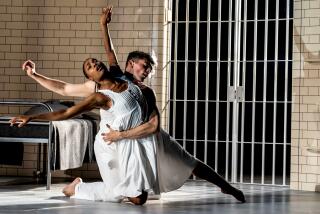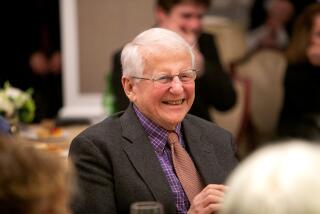History on stage: My, but the past looks a lot like today
STRATFORD-UPON-AVON, England — The history play, that genre that at its best transcends the oft-quoted line in Shakespeare’s “Richard II” — “let us sit upon the ground, And tell sad stories of the death of kings” — is making a striking comeback in Britain.
The hottest theatrical offering in recent months has been a two-part, six-hour dramatization of the political machinations of Henry VIII’s court. The Royal Shakespeare Company production of “Wolf Hall” and “Bring Up the Bodies,” adapted from Hilary Mantel’s Booker Prize-winning novels by Mike Poulton, returns us to 16th century England, with the slippery political operator Thomas Cromwell getting a fairer-than-usual shake in this dynamic retelling.
This sensationally acted production, which ended its run at the RSC’s Swan Theatre here in Stratford-Upon-Avon last month, transfers to the Aldwych Theatre in London’s West End on May 1, just in time for the summer tourist season. The Henry VIII saga, blending political intrigue, religious discord and soap opera sex, continues to exert a hold on audiences, as borne out by the cottage industry of books and TV programs about this excessively connubial monarch, who famously cared more about his bed than his altar’s décor.
PHOTOS: Arts and culture in pictures by The Times
With their sprawling narrative sweep, Mantel’s novels might seem to lend themselves more readily to television than to the stage, and indeed a BBC miniseries starring Mark Rylance is in the works. But Mantel is a marvelous contriver of stage-worthy scenes. Her storytelling unfolds in a succession of vivid confrontations, some explicit, most menacingly implicit, that thrive on the intimacy and immediacy of the theater.
Jeremy Herrin’s majestic staging on Christopher Oram’s uncluttered set allows the flow of entrances and exits to proceed with maximum swiftness. Nearly all the action is channeled into dialogue, the conversation as economical as the production’s reliance on props. (Oram’s vibrant costumes and Paule Constable’s darkly entrancing lighting conjure the various settings with dreamlike simplicity.)
Mantel is extraordinarily adept at mapping out the inner life of her protagonist, Thomas Cromwell, without sacrificing ambiguity. And Poulton, working in a more constricted medium, is able to provide enough suggestive cues for Ben Miles to portray Cromwell in a manner that is at once sly, decisive and surprisingly sympathetic. (The actor’s mild good looks and affable demeanor soften our impression of a historical figure whose reputed ugliness was considered a mark of his dangerous, double-dealing character.)
PHOTOS: Best in theater for 2013 | Charles McNulty
“Wolf Hall” centers on Cromwell’s survival of the fall of his mentor, Cardinal Wolsey (Paul Jesson), who didn’t play his cards right in handling the desire of Henry VIII (Nathaniel Parker) to rid himself of his wife, Katherine of Aragon (Lucy Briers), for failing to give him a male heir. The king is smitten with Anne Boleyn (Lydia Leonard), but divorce is a complicated matter involving the pope and the fate of England’s religious identity.
In “Bring Up the Bodies,” Cromwell — once the cardinal’s fixer, now the king’s — is occupied with managing the fallout from Henry’s marriage to Anne, who has yet to deliver Henry a male child. With England isolated after Henry’s rift with the Catholic Church, the court has become only more dangerous. The self-made Cromwell, squaring off against the arriviste queen in a ruthless royal power grab, has an intuitive grasp that the only safety is in staying one step ahead of the competition.
Mantel has yet to write the final novel in a three-part series. This leaves the audience for the RSC’s production, if not in medias res, then still a ways off from Cromwell’s inevitable demise. (The unfinished nature of the cycle would make this a hard sell for Broadway; a more plausible American future would involve a limited presentation at the Brooklyn Academy of Music, Lincoln Center Festival, the Broad Stage or the Center for the Art of Performance at UCLA.)
CRITICS’ PICKS: What to watch, where to go, what to eat
Seeing some parallels
But what is the driving vision behind this dramatization, other than to capitalize on the huge popularity of these historical novels? Mantel exquisitely animates this familiar material with a fresh take on Cromwell’s character. She takes a free hand creating his inner life while hewing as faithfully as possible to a historical record that can be vague or contradictory in places. The bracing lyricism of her writing supplies the damp woolly textures of daily life in 16th century England. She makes the Tudor period buzz with contemporary vitality again.
The books, ramblingly fertile, are in no rush to the finish line. Drama, however, is a tighter, more time-conscious form, less accommodating of meditative digressions. Playwrights aren’t by nature more reductive than novelists. They must, however, be more disciplined.
Traditionally — and by tradition, I mean Shakespeare — the history play has used the momentous past to hold a mirror up to contemporary politics. (On Broadway at the moment, Bryan Cranston is starring as President Lyndon B. Johnson in Robert Schenkkan’s “All The Way,” about the passage of the Civil Rights Act of 1964 — a dramatic subject surely not unrelated to today’s chronic congressional gridlock.) As Shakespeare scholar R.L. Smallwood observed, “If comedy is that form of drama which concerns itself with social man, and tragedy with moral or ethical man, then history is above all an exploration of human political behavior, of the desire for power, of men’s response to gaining it and being deprived of it.”
PHOTOS: Hollywood stars on stage
Much is made of Cromwell’s commoner status in both the novels and the adaptations. The son of a blacksmith, he rose well above his station through the sharpness of his intelligence and the shrewdness of his political instinct. The opening of Mantel’s “Wolf Hall” finds young Thomas lying on the ground after having been brutally beaten by his father. This scene is cut by Poulton, but it’s impossible to lose sight of Cromwell’s origins, the way he’s derided at the court by his intellectual inferiors who consider themselves superior simply because of their class pedigree. Cromwell’s Machiavellianism is as much about defense as offense.
The system, not unlike our own, is rigged. To succeed one must play dirty while showing clean hands. Britain today is a vastly different society, but the ferociousness of 21st century capitalism, with its stark division between economic winners and losers, makes Cromwell’s story less remote than it might seem. Surely there are investment bankers out there, self-made types with little regard for rules that rarely served them when they were squeaking by, who can identify with Cromwell’s disdain for fair play.
It was in London, while attending Peter Gill’s highly absorbing drama “Versailles” at the Donmar Warehouse, a play set at the end of World War I, that I began to see a through line with the contemporary use of history in this period of ours of stark geopolitical disruption.
“Versailles,” which looks at the impact of the war on a family whose son is among the British delegation sent to France to draw up the treaty that will come to define much of the world for the next century, is a historical drama rather than a history play. (History plays, of course, can contain a fair amount of invention, but their plots, which are more tied to national events, are necessarily restricted by fact.)
Gill’s play, which ended its sold-out run last month, reflects on this watershed moment in 20th century history to comment on an economic reality that seems to have grown only more pronounced in the 21st: that nothing matters more to nations than their untrammeled access to markets. Even in the wake of millions of casualties (or, fast-forward to our time, irreversible environmental calamity), the ruling class wants merely to perpetuate its hold on power.
As with “Wolf Hall” and “Bring Up the Bodies,” “Versailles” succeeds to the extent that it convincingly resurrects another epoch. Yet as the theater converts the past into the present, the fog concealing those recurring patterns imperiling individuals and societies is momentarily dispelled.
The history play, it is believed, derived from the medieval morality play, and one of the welcome features of its popular return is the instructive example it provides an age badly in need of the long view.
More to Read
The biggest entertainment stories
Get our big stories about Hollywood, film, television, music, arts, culture and more right in your inbox as soon as they publish.
You may occasionally receive promotional content from the Los Angeles Times.







